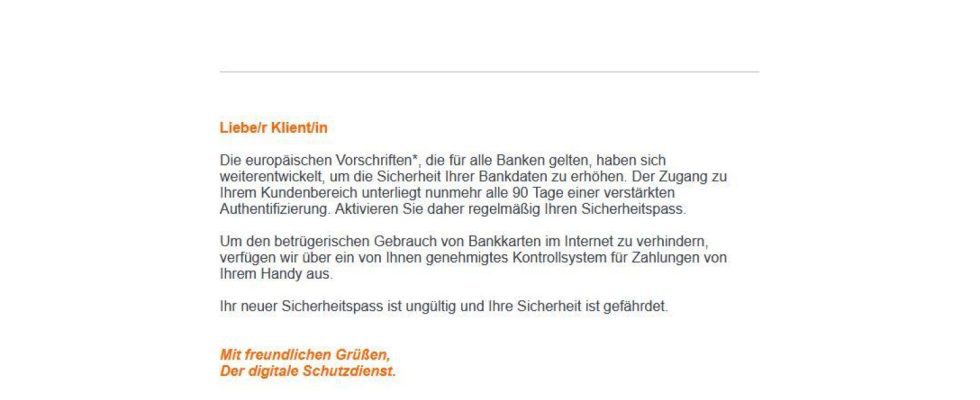Phishing scammers put you under pressure with European regulations and want to plunder your ING-DiBa account. With our help you can recognize the stitch.
With this phishing email, fraudsters want to crack your ING-DiBa account. (Source: consumer center)
- As a customer of ING-DiBa, you have to be wary of phishing emails.
- Changed European regulations are the pretext for data theft.
- Do not follow the instructions in the email and delete it.
Are you one of the ING-DiBa customers and have you received an email with the subject “Suspension of your access”? Then you should be careful. The message is actually a phishing attempt. Cyber criminals want to use this scam to lure you to a dubious site and get hold of your account information.
You can already tell from the impersonal address that it is a phishing email. In the further course of the text, the fraudsters use supposed changes in European regulations as an excuse to sell you a security pass. Allegedly, access to your account is now subject to authentication every 90 days. In order to prevent the misuse of your bank details, which you are about to fall for, it is necessary to activate a security pass on a regular basis.
According to the consumer advice center, the data theft is carried out via an attached link that says “Continue to”. Where the link leads to or which solution is behind it is not clear from the text. Another clear indication of a fraud attempt.
We advise you to move the e-mail to the spam folder unanswered and to keep your hands off the link. If you are unsure when you receive an email as to whether it is a fake, always contact your bank directly via the official channels. It is worth installing a comprehensive antivirus program so that no more phishing emails end up in your inbox.
Simple signs: This is how you recognize every phishing email
A first indication that you have received a phishing email: the email will ask you to confirm personal data or to enter it on a website. This Under no circumstances should you comply with the request. In addition, criminals often use the official logos of the companies they are copying in their emails, but not official sender addresses.
If you find the sender suspicious, you should read the email twice. You will often find spelling mistakes or inconsistencies in German grammar. The attackers usually do not write their emails themselves, but instead use automatically generated messages or translate known emails with a translation program. But why all the effort?
What do criminals achieve with phishing attacks?
Phishing is used on the Internet to collect real user data. Money can be made with these if e-mail addresses, names and other information are sold for advertising purposes or passed on in criminal forums. With the data obtained, cyber criminals can also address future phishing attacks in a more targeted manner, making their attacks more effective.
Did you receive a suspicious email?
Forward them to [email protected]
or follow us on:
Phishing Checklist
- ✔
Spelling mistake? - ✔
Sensitive data requested? - ✔
Official logos? - ✔
Unknown sender?
Attachments and links contained in malicious e-mails also often inject malware or viruses onto your computer. In addition, you should not simply ignore suspicious emails. Forward them to the above email address and help us report future phishing attacks.
More fraud alerts on netzwelt – stay one step ahead of cybercriminals
But phishing emails are not the only danger lurking on the internet. In addition to fraud attempts, there are all kinds of viruses, Trojans and malware that can infect your computer. Unfortunately, data scandals are also part of everyday digital life. You can see the five most recent articles on the subject of “Scam Alerts” below:
Do you want to stay informed about the latest fraud reports, Subscribe to netzwelt on Twitter, Facebook and Instagram. You can also find all articles on the subject on the next page.
Don’t miss anything with the NETWORK-Newsletter
Every Friday: The most informative and entertaining summary from the world of technology!
